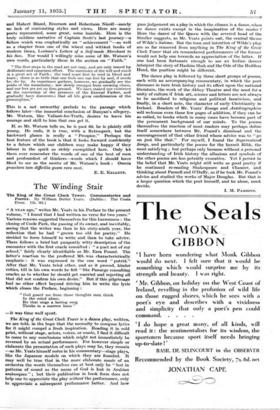The Winding Stair
A YEAR ago,, ' writes Mr. Yeats in his Preface to the present volume, " I found that I had written no verse for two years." Various reasons suggested themselves for this barrenness : the closing of Coole Park, the passing of its owner, and inevitably, seeing that the writer was then in his sixty-ninth year, the reflection that he had " grown too old for poetry." He decided to force himself to write and then to take advice. There follows a brief but pungently witty description of the encounter with the first -oracle consulted : " a poet not of my school," fairly clearly identifiable as Mr. Ezra Pound. The latter's reaction to the proffered MS. was characteristically emphatic : it was expressed in the one word " putrid.'? After that Mr. Yeats tried other, and as it proved, kinder critics, till in his own words he felt like Panurge consulting oracles as to whether he should get married and rejecting all that did not confirm his own desire." But if this pilgrimage had no other effect beyond driving him to write the lyric which closes the Preface, beginning :
" God guard me from those thoughts men think In the min' d alone,
He that sings a lasting song Thinks in a Disavow bone " —it was time well spent.
The King of the Great Clock Tower is a dance play, written, we are told, in the hope that the necessity to compose lyrics for it might compel a fresh inspiration. Reading it in cold print, without stage, actors, voices, or music, I find it difficult to come to any conclusions which might not immediately be reversed by an actual performance. For however simple or elaborate the presentation of such plays may be, they remain as Mr. Yeats himself notes in his commentary—stage plays, like the Japanese models on which they are founded. It may well be true that in the more elaborate music of an orchestra the words themselves can at best only be " lost in patterns of sound as the name of God is lost in Arabian arabesques " ; but their publication in book form does not help one to appreciate the play without the performance, only to appreciate a subsequent performance better. And how pass judgement on a play in which the climax is a dance, when no dance exists except in the imagination of the reader ? Here the dance' of the Queen with the severed head of the Stroller suggests, as Mr. Yeats points out, the central theme of Wilde's Salome. But the tone and intention of Wilde's play are so far removed from anything in The King of the Great Clock Tower that six remembered performances of the former would not help one towards an appreciation of the latter. If one had been fortunate enough to see ,an Indian dancer interpret the story.of Hashim Shah and the Ode of the Bodiless Head, the position might be different.
The dance play is followed by three short groups of poems, each with an accompanying commentary, in which the poet discusses in turn Irish history and its effect upon the national literature, the work of the Abbey Theatre and the need for a unity of culture if Irish art, science and letters are not always to be sacrificed to religious and political fanaticism, and finally, in a short note, the character of early Christianity in Ireland. Readers of Mr. Yeats' Essays and Autobiographies will welcome even these few pages of addition, if they can be so called, to books which in many cases have become part of the permanent background of our minds. To the poems themselves the reaction of most readers may perhaps define itself somewhere between Mr. Pound's dismissal and the encouragement of that other friend whose advice was to " go on just like that." For myself, I found the Supernatural Songs, and particularly the poems for the hermit Rihh, the most satisfying ; but perhaps only because without a personal understanding of Irish history the allusions and symbols of the other poems are less potently evocative. Yet I persist in the belief that Mr. Yeats might still write as good poetry if he continued re-reading Shakespeare and Chaucer, and thinking about Parnell and O'Duffy, as if he took Mr. Pound's advice and studied the works of Major Douglas. But that is a larger question which the poet himself, and he alone, must decide.
I. M. PARSONS.






































 Previous page
Previous page